News
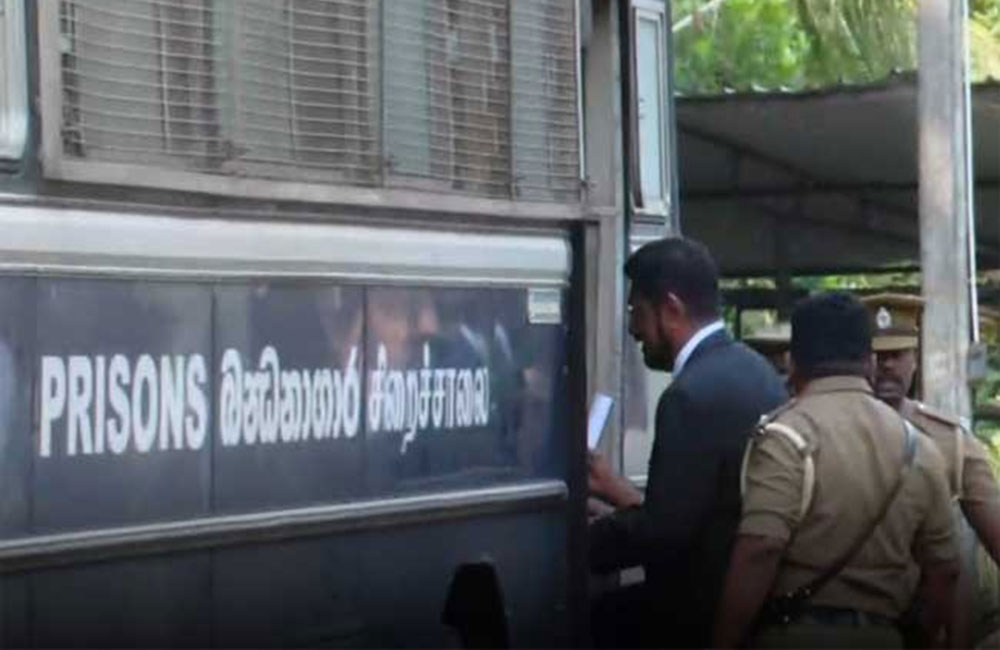
Keheliya Rambukwella Returned To Remand
Seven suspects, including former Minister of Health Keheliya Rambukwella, have been remanded in custody until April 22 over the medicine procurement scandal.
The Criminal Investigation Department (CID) arrested Rambukwella on 02 February in connection with the procurement of substandard human intravenous immunoglobulin (IVIG), when he arrived there, complying with a court order. He had been grilled for nearly 10 hours before being arrested.
The arrest came hot on the heels of pressure from civil society activists and health sector trade unionists, who called for the immediate apprehension of the lawmaker.
Prior to the apprehension of Rambukwella, seven arrests had been made in connection with the drug procurement scam. But the fifth accused was later released on bail. As such, the former Health Secretary, the Director of the Health Ministry’s Medical Supplies Division (MSD) and three other officials of the same division, as well as the owner of the company, which is said to have supplied the substandard batch of immunoglobulin vials, now remain in remand custody.
Meanwhile a Fundamental Rights (FR) petition was filed Thursday (29 Feb.) on behalf of former Health Minister Keheliya Rambukwella.
Rambukwella’s attorneys have filed the relevant petition challenging his arrest by the Criminal Investigation Department (CID), and demanding a compensation of Rs. 100 million.
The individuals who currently remain under remand custody over the alleged drug scandal include former Health Minister Keheliya Rambukwella, former Health Ministry Secretary Janaka Chandragupta, Additional Secretary of the Health Ministry Dr. Saman Ratnayake, the Director of the Health Ministry’s Medical Supplies Division and three other officials of the same division, as well as the owner of the relevant company which is said to have imported the batch of substandard Immunoglobulin vials by forging documents.
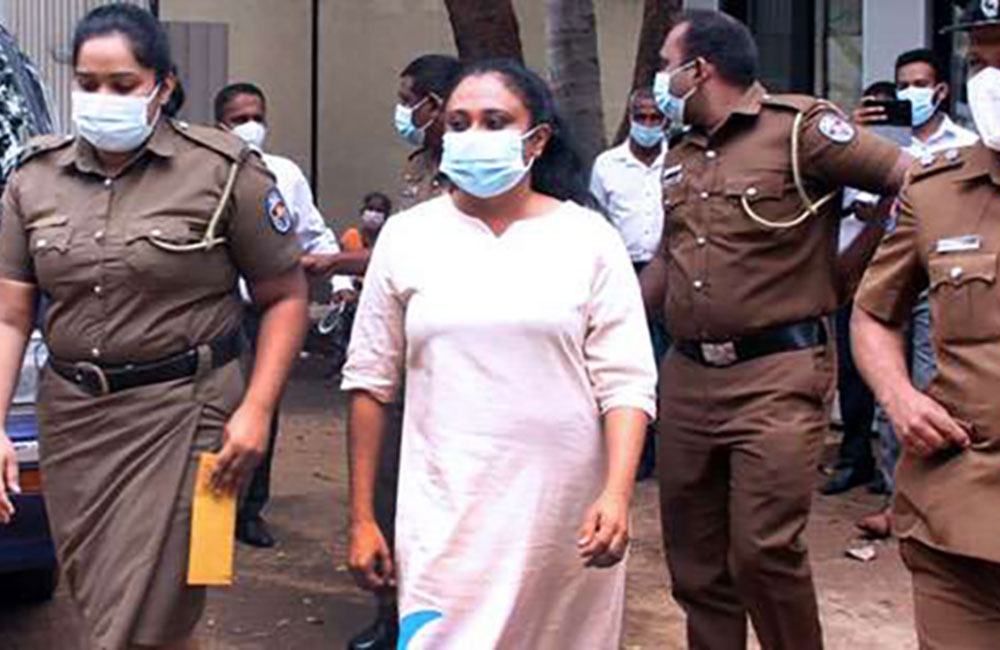
Damitha Abeyratne & husband remanded over financial scam
Sri Lankan actress Damitha Abeyratne and her husband who were arrested by the Criminal Investigations Department (CID) over an allegation of financial fraud have been remanded until April 17, 2024.
The couple were remanded after being produced before the Fort Magistrate’s Court today.
Damitha Abeyratne and her husband were arrested yesterday after having surrendered to the Fort Magistrate’s Court over the financial scam.
Previously, the Fort Magistrate’s Court had imposed a travel ban on the couple in connection to the case filed on the financial scam.
Earlier in the week, the Court of Appeal had rejected the couple’s request for an interim order preventing their arrest under the Immigrants and Emigrants Act.
Damitha Abeyratne and her husband have been accused of defrauding money amounting to nearly Rs. 3 million by claiming to provide foreign jobs.
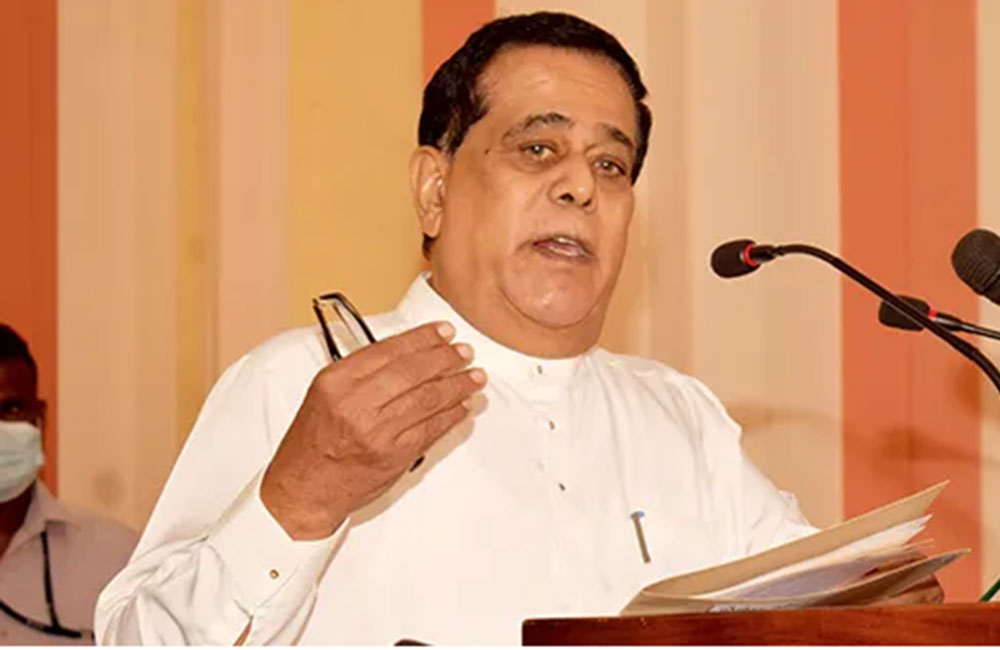
Nimal Siripala appointed Acting Chairman of SLFP
Minister Nimal Siripala de Silva has been appointed as the Acting Chairman of the Sri Lanka Freedom Party (SLFP).
The appointment was made during the SLFP’s politburo meeting held at the Sri Lanka Foundation Institute in Colombo today.
The special politburo meeting of the SLFP was held under the patronage of the Senior Vice President of the Party Nimal Siripala de Silva.
It was also reported that former President and former SLFP Leader Chandrika Bandaranaike Kumaratunga had also attended the meeting.
A change in the leadership of the SLFP comes after the Colombo District Court last week issued an interim order preventing former President Maithripala Sirisena from functioning as the Chairman of the SLFP.
The court order was issued based on a complaint filed by former President Chandrika Kumaratunga, who served as the Leader of the SLFP from 1994 to 2005.
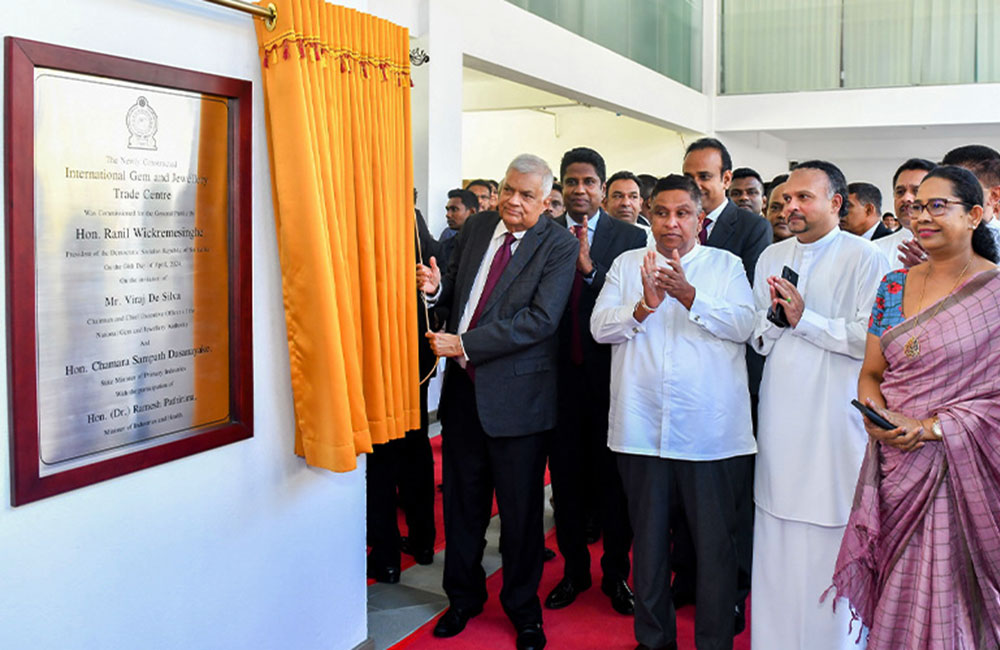
President Credits Government’s Favourable Environment for Allowing Public Participation in Politics
President Ranil Wickremesinghe emphasized that the government’s prudent decisions over the past two years have bolstered the nation’s economy, providing a favourable environment for political activities on the streets. However, he cautioned that the economy still faces challenges, urging citizens to weigh the choice of either continuing with the government’s initiatives for prosperity or risking regression.
Highlighting a remarkable increase of over 50% in government income in 2023 compared to 2022, President Wickremesinghe underscored the conducive backdrop for advancing confidently with a robust economy. These remarks were made during his attendance at the inauguration of the International Gem and Jewellery Trade Centre, known as the Ratnapura Gem Tower, this morning (04).
Plans have been shown for the construction of the Ratnapura Gem Tower in Demuwawa area of Ratnapura, to be executed in two phases. The initial phase saw the completion of a five-story building, costing Rs. 365 million. The forthcoming second phase entails the construction of an additional 14 floors, with an estimated expenditure of Rs. 450 million.
The newly inaugurated International Gem Trade Centre comprises 27 business premises, with 17 allocated to local entrepreneurs and 10 designated for foreign counterparts. Financing for this venture is sourced from the National Gems and Jewellery Authority, aiming to establish an international hub facilitating seamless transactions between sellers and buyers.
Functioning akin to renowned sales centres in Bangkok and Hong Kong, the centre will offer comprehensive services including independent quality testing, laboratory facilities, and banking and export services. This initiative aims to bolster the gem and jewellery trade, positioning Ratnapura as a pivotal player in the global market.
During his visit to the International Gems and Jewellery Trade Centre, President Ranil Wickremesinghe not only unveiled the plaque to mark its inauguration but also conducted an inspection tour of the facilities. As part of the occasion, a souvenir gift was presented to the President, and he left a commemorative note in the special guest book.
Addressing the gathering, the President emphasized the government’s commitment to further enhancing the gem and jewellery industry’s contribution to the national economy. He instructed officials to compile a report by the end of April outlining potential solutions to industry challenges and proposed reliefs for industry stakeholders. Notably, the President stressed the importance of ensuring benefits for gem miners as part of this initiative.
President Wickremesinghe highlighted the significance of the International Gem Trading Centre in elevating Sri Lanka’s gems to attain their rightful value on the international stage. This initiative aims to position Sri Lanka as a prominent player in the global gem and jewellery market, fostering economic growth and prosperity for the nation.
During his address at the event, President Ranil Wickremesinghe acknowledged the origins of the International Gems and Jewellery Centre, noting that its construction commenced during the tenure of former President Gotabaya Rajapaksa. He also paid tribute to the dedication of Ministers Lohan Ratwatte and Chamara Sampath to the project’s realization.
Highlighting the significance of the centre, President Wickremesinghe emphasized that its impact extends beyond Ratnapura, positioning it as a pivotal hub for the gem and jewellery industry nationwide. He reiterated the government’s commitment to fostering the industry’s growth and its pivotal role in contributing to the national economy.
Reflecting on the challenges faced by the gem and jewellery sector amid the COVID-19 pandemic and economic downturn in the 2021-2022 period, President Wickremesinghe noted a modest improvement in 2023. He underscored the industry’s resilience and its contribution as a cornerstone for economic recovery efforts.
“Following recent discussions with relevant ministries regarding challenges stemming from increased taxes in the gem and gold sectors, I have instructed officials to explore potential reliefs and submit a report by the end of this April,” President Ranil Wickremesinghe stated. “Additionally, we are aiming to generate at least USD 02 billion in revenue from this field in the future, with a particular emphasis on ensuring benefits for gem miners during the sector’s development.”
In reflecting on the country’s economic trajectory over the past two years, President Wickremesinghe acknowledged the difficult journey, which necessitated tough decisions, including tax hikes. Nonetheless, he underscored the positive outcomes achieved to date, instilling confidence for the future.
Highlighting a significant transformation in the country’s gross domestic product (GDP) growth, President Wickremesinghe noted a shift from a decline of minus 7.4 in July 2022 to a positive 4.5 in 2024. This marked improvement over two years underscores the resilience and perseverance of the population, who endured hardships and contributed to the nation’s economic advancement.
President Ranil Wickremesinghe provided insightful data on the country’s economic progress. He noted that in July 2022, inflation stood at a staggering 54.6%, but today it has significantly reduced to 0.9%. This control over inflation has contributed to the strengthening of the Sri Lankan Rupee. Additionally, bank interest rates have decreased from 23.8% to 10.3%, with expectations for further reduction in the coming months as stated by the Governor of the Central Bank.
President Wickremesinghe highlighted the improvement in the foreign exchange rate, which has decreased from Rs. 361.80 per dollar in the past to Rs. 300.40 presently. Efforts are underway to further lower this rate to Rs. 280, aiming to bolster the strength of the rupee.
In terms of government finances, President Wickremesinghe emphasized a significant increase of over 50% in government income in 2023 compared to 2022. Furthermore, expenditure for social services has tripled, reflecting the government’s commitment to enhancing social welfare.
Regarding debt restructuring, President Wickremesinghe noted the completion of discussions on domestic debt and highlighted the on-going negotiations with creditor countries. He stressed the importance of adhering to relevant goals and agreements, including those with the International Monetary Fund, to ensure the successful continuation of this process.
President Ranil Wickremesinghe outlined ambitious targets for reducing government debt as a percentage of GDP, aiming to bring it down from the current 128% to 95% by 2032. He emphasized the necessity of achieving a cash income of 35% of GDP, which needs to be reduced to 13% by 2032. Additionally, the goal is to transform foreign loans, which currently stand at 9.4% of GDP, into a surplus of 2.3% by 2025.
President Wickremesinghe stressed the importance of adhering to these targets to avoid repercussions such as demands for loan repayment from creditor countries.
Highlighting recent positive developments, President Wickremesinghe mentioned a successful harvest during the Maha season and efforts to increase salaries for government employees during this New Year season. He also noted relief provided through increased Aswesuma benefits and announced plans to distribute an additional 20 kilograms of rice to low-income individuals in the coming months. Moreover, the initiation of decentralized budgeting has injected funds into the rural economy, while tourism and foreign exchange earnings have shown promising signs of recovery, contributing to the reconstruction of the country’s income landscape.
President Ranil Wickremesinghe highlighted the stark contrast between the challenging conditions of the past and the current improved situation. He pointed out the scarcity of fuel for three-wheelers and electricity shortages in previous times, contrasting it with the present abundance of fuel and availability of electricity. President Wickremesinghe noted that the income of three-wheeler drivers has also increased, attributed to the influx of both domestic and foreign tourists. He emphasized the significance of these improvements by highlighting the three-wheeler drivers’ involvement in political activities, while displaying posters, which would not have been feasible without the economic progress achieved in the last two years.
President Wickremesinghe stressed the importance of safeguarding the current economic gains and moving forward. He cautioned against the risk of regression, emphasizing that the country still teeters on the edge economically. He called for a decisive choice between either falling back into past hardships or continuing to advance from the current position.
Adressing the gathering, Industry and Health Minister Dr. Ramesh Pathirana expressed his enthusiasm as the International Gem Trade Centre, initiated in 2021, is officially inaugurated today. Dr. Pathirana emphasized the pivotal role of this centre in facilitating rapid growth in the country’s foreign exchange earnings, providing a crucial platform for gem businessmen. He highlighted the proactive approach taken by local leaders in addressing the challenges faced by gem traders, with the President offering directives for prompt resolutions.
Comparing Sri Lanka’s gem trade performance to that of Hong Kong and Thailand, Dr. Pathirana underscored the immense potential for revenue generation. Despite Sri Lanka’s abundant gem resources, its income in this sector remains comparatively low. Dr. Pathirana advocated for the timely promotion of free trade, akin to the successful models in Thailand and Hong Kong, expressing confidence in the endorsement of such economic initiatives by the President.
Minister of Wildlife, Forest Resources Conservation and Irrigation Mrs. Pavithradevi Wanniarachchi, hailed the inauguration of the International Gem Trade Centre in Ratnapura as a significant boon for the nation’s economy. She acknowledged the myriad challenges faced by gem businessmen in the past, including the burden of high bank interest rates amidst an economic crisis.
Minister Wanniarachchi credited President Ranil Wickremesinghe’s economic policies upon assuming office, which provided much-needed relief not only to gem traders but also to the wider populace. She highlighted the establishment of the international gem trade centre as a testament to President Wickremesinghe’s efforts in uplifting the country’s economic stature. Furthermore, Minister Wanniarachchi commended initiatives such as the Aswesuma program, aimed at safeguarding the livelihoods of twenty lakh impoverished families, and the Urumaya program, which sought to secure land rights for citizens.
In concluding her remarks, Minister Wanniarachchi underscored President Wickremesinghe’s demonstrated leadership and capability in steering the nation through tumultuous times, emphasizing the importance of experienced leadership for the country’s progress.
Minister of State for Primary Industries Chamara Sampath Dasanayake, expressed his optimism regarding the opening of the International Gem Trade Centre, emphasizing its potential to significantly benefit not only Ratnapura but also the entire nation’s economy. He highlighted the centre s ability to centralize and streamline the gem business community in Ratnapura, thereby boosting income generation rates. State Minister Dasanayake underscored that the centre is fully equipped with facilities essential for the gem business.
In response to media reports discussing economic development, State Minister criticized political leaders who had not stepped forward to address the economic crisis in 2022, yet now seek to engage in debates regarding the country’s economic progress. He questioned the credibility of individuals who failed to develop the housing development authority in spearheading the nation’s economic development efforts.
Member of Parliament W.D.J. Seneviratne highlighted the historical significance of gemstones in Sri Lanka and lamented the lack of a comprehensive program to properly value and showcase them on the global stage. He commended the establishment of the International Gem Trade Centre as a landmark initiative, marking the first concerted effort to bring Sri Lanka’s gem industry to the world market.
Mr. Seneviratne emphasized the importance of this international centre in facilitating the sale of Sri Lankan gems at fair prices globally, which in turn would contribute to the economic recovery of the country. He noted that the conception of this centre dates back to 2012, and its completion despite numerous challenges represents a victory for both the business community and the nation as a whole.
The event was attended by a distinguished gathering including the Chancellor of Uva-Wellassa University and the Chief Incumbent of the Sri Pada Temple (Adams Peak) Ven. Bengamuwe Dhammadinna Nayaka Thera, Ministers of State Lohan Rathwatte and Janaka Wakkumbura, as well as Members of Parliament Akila Ellawala and Gamini Waleboda. Also in attendance were the Governor of the Sabaragamuwa Province Navin Dissanayake and the Chairman of the National Gems and Jewellery Authority Viraj Silva, alongside prominent gem businessmen and members of the gem and jewellery community.
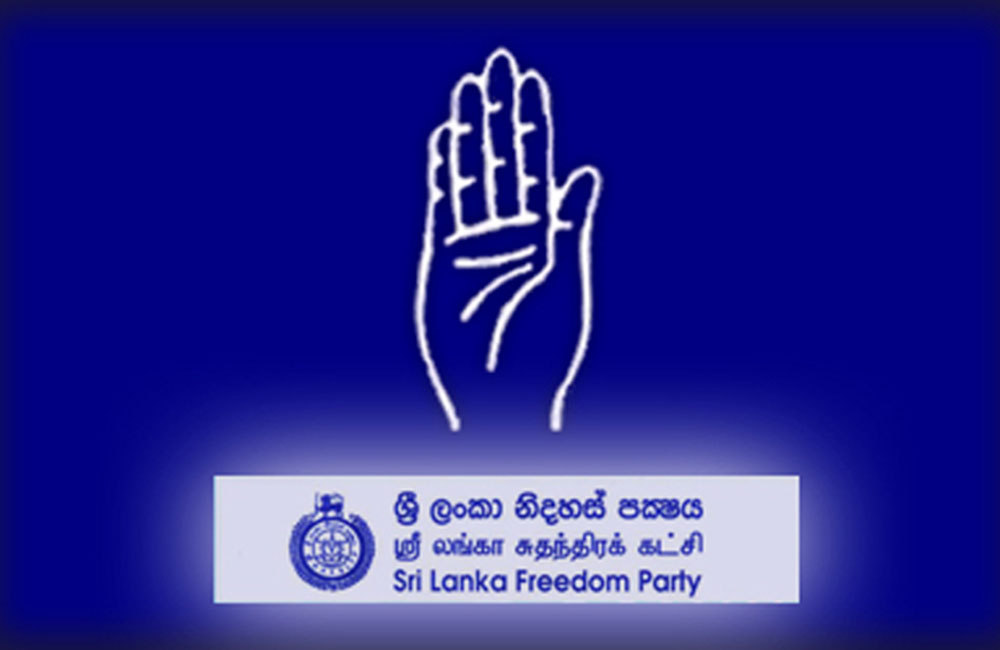
SLFP convenes urgent politburo meeting led by CBK
The Sri Lanka Freedom Party (SLFP) has summoned the party’s politburo on Monday (March 08) to discuss the future course of action of the party, in view of its current internal crisis situation.
The meeting will reportedly be chaired by former President Chandrika Bandaranaike Kumaratunga.
On Thursday (04), the Colombo District Court issued an interim injunction preventing former President Maithripala Sirisena from functioning as the SLFP chairman, following a complaint filed by former President Chandrika Bandaranaike Kumaratunga.
Nevertheless, Sirisena has reacted, saying that he intends to present facts before the court regarding the matter.
Meanwhile, the Acting General Secretary of SLFP Dushmantha Mithrapala lodged a complaint with the Maradana Police on Friday (05), alleging that several ‘important’ files have gone missing from the party headquarters.
Thus, entering the SLFP headquarters in Darley Road, Colombo 10, has been prohibited for all individuals, due to the ongoing investigation into the relevant complaint.
However, the said politburo meeting will accordingly take place at the Sri Lanka Foundation Institute.
It was reported that all party members excluding former President Maithripala Sirisena, former General Secretary Dayasiri Jayasekara and MP Shan Vijayalal de Silva have been invited for the relevant meeting.
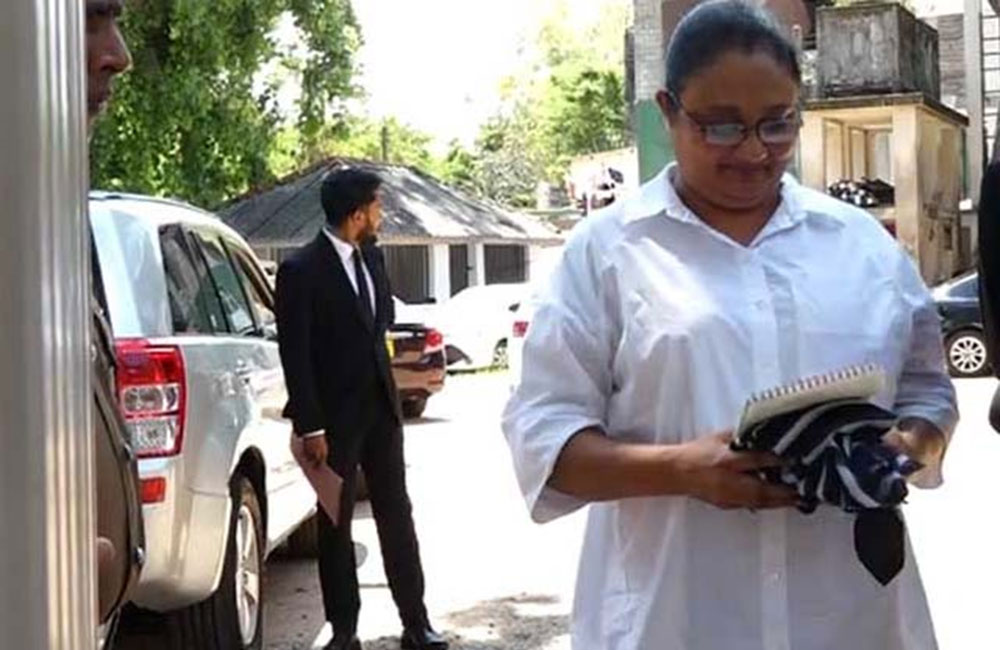
Damitha Abeyratne and husband arrested by CID
Sri Lankan actress Damitha Abeyratne and her husband were arrested by the Criminal Investigation Department (CID) today (04).
The arrest came after the couple, who had been wanted by the CID, appeared before the Colombo Fort Magistrate’s Court earlier.
The CID is currently carrying out an investigation into Abeyratne and her husband, in relation to their involvement in an alleged money scam.
Speaking to the media at the courts premises, Abeyratne said: "I was not in hiding. Damitha is not someone who can hide in this country; she is a woman who fought against the corrupt system that garnered 69 lakh votes. Today, I surrender to the court. I will also celebrate the New Year in prison."
The Computer Crimes Division of the CID had initiated an investigation into the alleged defrauding of Rs. 3 million by the couple on the promise of employment in South Korea. Subsequently, the CID informed the court that Abeyratne and her husband would be named as suspects of the relevant case.
Accordingly, Fort Magistrate’s Court recently rejected a writ petition filed seeking to prevent their arrest.
Meanwhile, Fort Magistrate Thilina Gamage imposed an overseas travel ban on the couple on Wednesday (03), with respect to the incident.
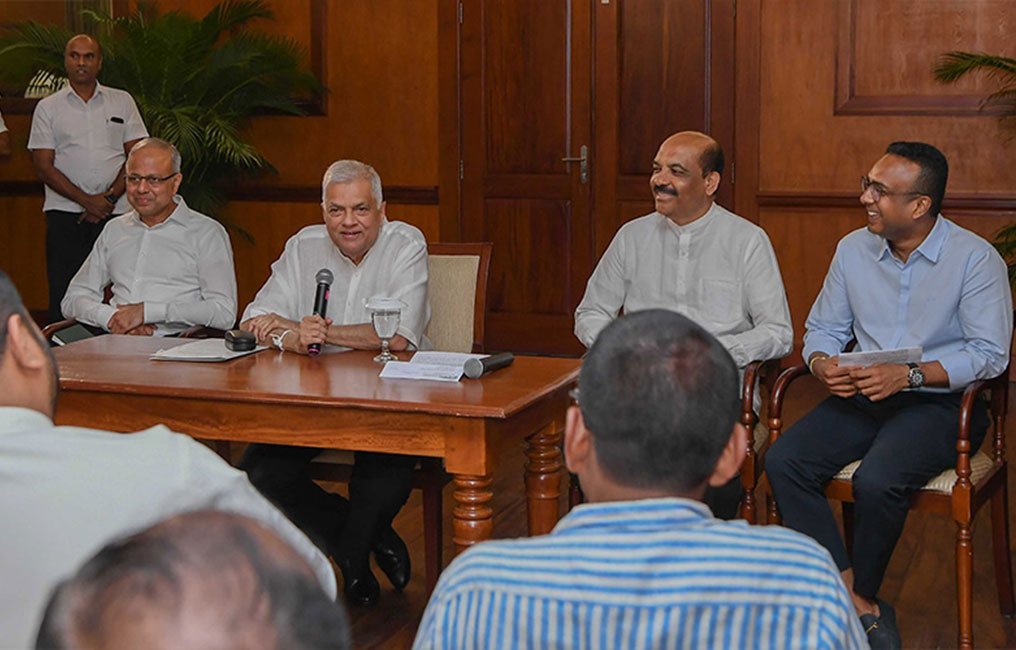
A committee from the President to Protect the Traditional Kandyan Dance
President Ranil Wickremesinghe announced the formation of a committee tasked with preserving and maintaining the rich cultural heritage of Kandyan dancing art. This decision was made during a meeting with Kandy traditional dancers at the President’s House in Kandy this morning (07).
The committee will comprise representatives from relevant institutions such as the Ministry of Cultural Affairs and the University of Visual and Performing Arts. President Wickremesinghe emphasized the importance of including a representative of traditional Kandyan dancers in this committee to ensure their voices are heard and their interests represented.
Additionally, the President instructed Minister of Labour and Foreign Employment, Manusha Nanayakkara, to explore the possibility of providing pensions to traditional Kandyan dancers as a gesture of recognition for their invaluable contribution to the cultural heritage of Sri Lanka.
Acknowledging the popularity of Kandyan dance both locally and internationally, President Wickremesinghe highlighted the need to address issues related to the preservation of traditional practices and rituals associated with this art form. The newly formed committee will be tasked with providing recommendations on how to effectively safeguard and promote Kandyan dance for future generations.
Furthermore, the President underscored the significance of preserving other traditional arts of the country, such as the Sabaragamuwa dance, and instructed officials to address the challenges faced by traditional dancers in Kandy, ensuring they receive the necessary support and recognition.
In expressing their gratitude for President Wickremesinghe’s initiatives aimed at fostering economic growth and creating a better country for all citizens, traditional dancers in Kandy commended the efforts undertaken to preserve and promote Sri Lanka’s cultural heritage.
Minister Manusha Nanayakkara, Senior Adviser to the President on National Security, and Chief of Presidential Staff Sagala Ratnayaka, along with United National Party General Secretary Palitha Range Bandara, were also present during this significant occasion.
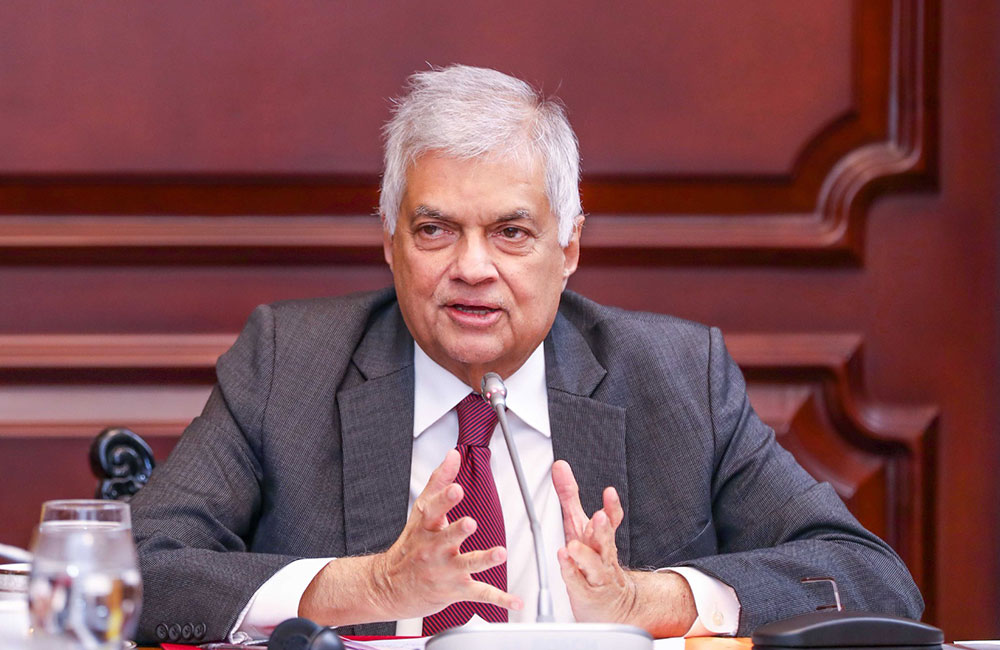
President instructs to ensure seamless essential services during Avurudu
President Ranil Wickremesinghe has given directives to implement a formal program aimed at maintaining essential services and public services seamlessly during the upcoming Sinhala and Tamil New Year (Avurudu) season.
This initiative is intended to guarantee the smooth operation of essential services without any disruptions during the festive season, the President’s Media Division (PMD) said.
In addition, Wickremesinghe has emphasized that institutions that fall under the ‘essential’ category such as the Presidential Secretariat, Prime Minister’s Office, Defence Ministry, Health Ministry, Transport Ministry, and Power and Energy Ministry must collaborate to prepare this program in tandem.
Additionally, for the upcoming Sinhala and Tamil New Year season, the President has directed the security forces to execute a comprehensive program to ensure public security and the maintenance of law and order across the country.
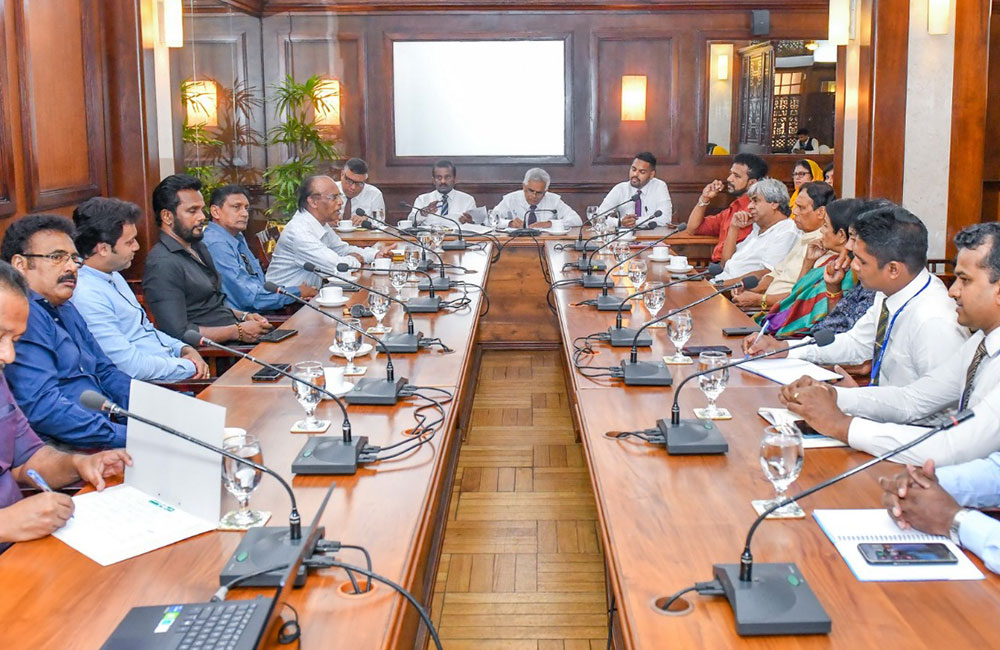
Loan scheme for cinema artistes
A loan scheme for cinema artistes will be introduced for their welfare, said presidential advisor on economic affairs Dr. R.H.S. Samaratunga.
At a meeting with cinema artistes on 02 April, he requested them to submit their proposals to the government for the upliftment of local cinema.
Samaratunga said the matter of a pension for artistes would be raised as well, since the one introduced in 1993 has been disappointing.
Presidential director general on trade union affairs Saman Ratnapriya said at the meeting that a medical insurance scheme for artistes would be introduced by Sri Lanka Insurance.
Among those present were Film Corporation chairman Deepal Chandraratne and artistes Sugath Samarakoon, Padmasiri Kodikara, Raj Ranasinghe, Arjuna Kamalanath, Wasantha Kumarawila and Nadeeka Gunasekara.
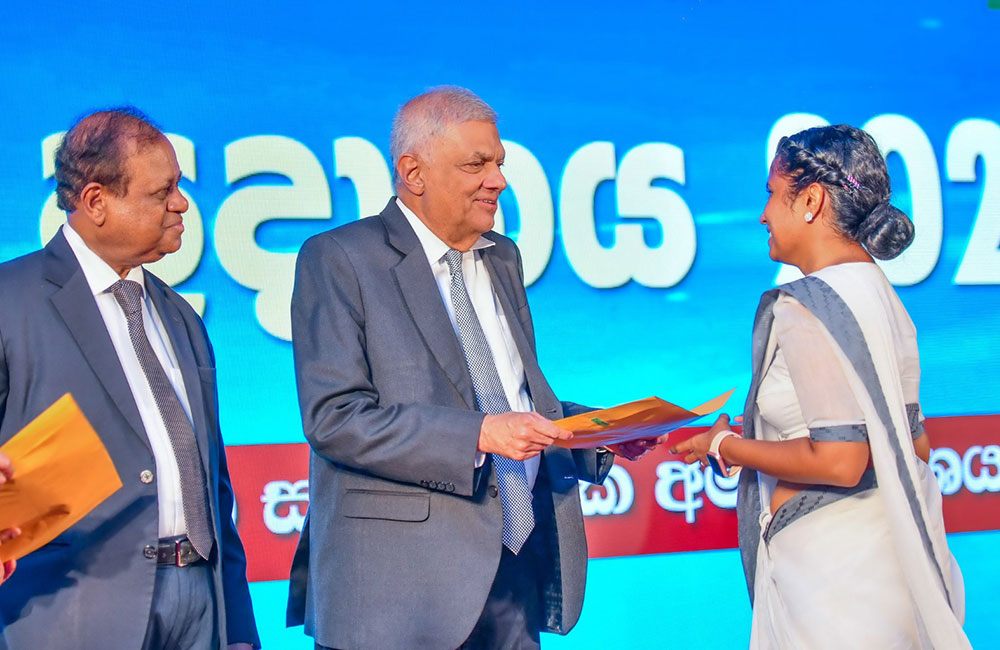
President Unveils Plans on Filling Teacher Vacancies as Economy Strengthens; Appoints 2320 Graduate Teachers
President Ranil Wickremesinghe announced significant strides in education, revealing that the government has initiated the recruitment of approximately 4,000 teachers in 2024. With the bolstering of the country’s economy, he assured that more funds would be allocated to fill teaching vacancies by the following year.
Speaking at the Ceremony for Awarding Letters of Appointment to Graduate Teachers in Western Province held at the Temple Trees this evening (03), President Wickremesinghe emphasized the pivotal role of teachers in shaping the future generation. Symbolically participating in the awarding of the letters of appointment to 2,320 graduate teachers, he underscored the responsibility bestowed upon educators to instil character and virtue in their students.
President Wickremesinghe stressed the importance of preserving the respect associated with the teaching profession, labelling it as an honourable vocation. He urged teachers to continually update their subject knowledge, recognizing the dynamic nature of education in today’s world.
The president further remarked, emphasizing the profound impact teachers have on their students’ futures. He emphasized that teachers aren’t just assuming control of a classroom; they’re entrusted with shaping the destinies of the students within it. With students spending crucial formative years from ages 5 to 19 under their guidance, both the influence from home and that imparted at school are paramount.
President Wickremesinghe underscored the weighty responsibility of educators, stating that they are not merely tasked with imparting subject knowledge but also with moulding the lives of their students. He highlighted the irreplaceable role of teachers in character-building, noting that while subject knowledge can be acquired online, the same cannot be said for instilling values and virtues.
Acknowledging the invaluable contributions of both parents and teachers in shaping individuals’ lives, the president emphasized the esteemed status of the teaching profession. He called upon all educators to uphold the honour associated with their vocation and to recognize the profound impact they have on the lives of their students.
The president emphasized the indispensable role of teachers’ knowledge in today’s rapidly evolving society. With knowledge continuously advancing, educators must ensure they keep pace with these developments. President Wickremesinghe noted that unlike in the past, where teachers could rely on existing knowledge, today’s educators must constantly strive to enhance their subject expertise. He urged teachers to contemplate whether their current knowledge would suffice in the coming decades, emphasizing the importance of on-going professional development.
Regarding the recent teacher recruitments, President Wickremesinghe highlighted that while 2300 teachers have been appointed, there are still 700 vacancies to be filled. Plans are underway to hire approximately 1000 more teachers based on existing vacancies. This year alone, around 4000 teachers have been recruited, marking a significant milestone after a hiatus of three to four years. The president attributed the resumption of teacher recruitments to the country’s economic recovery and the easing of constraints imposed by the COVID-19 pandemic, which had previously halted such initiatives.
President Wickremesinghe highlighted the positive economic trajectory achieved through prudent fiscal management by the government. Despite a previous period of economic decline, the Sri Lankan economy has witnessed a strengthening, leading to the appreciation of the rupee against the dollar. The President attributed this positive shift to effective economic policies implemented by the government, allowing for the current recruitment of teachers.
Last year, the rupee had depreciated to 370 against the dollar, but today, it stands at 300. The President expressed his optimism in further reducing this value to 280 in the future, which would bolster the purchasing power of the people. He emphasized the government’s commitment to facilitating economic growth and providing financial resources for essential public services.
Despite facing challenges, President Wickremesinghe underscored the government’s achievements in enhancing public sector salaries and benefits, tripling Aswesuma benefits and ensuring fair prices for agricultural produce, particularly during the Sinhala New Year season. Looking ahead, he affirmed the government’s dedication to further bolstering economic development, with plans to allocate additional funds to the education sector for teacher recruitment by the following year.
Minister of Education, Dr. Susil Premjayantha, addressed the delay in teacher appointments, acknowledging that these appointments should have been made six months prior. He explained that, in response to President Wickremesinghe’s directives, a memorandum was submitted to the Cabinet to address the teacher shortage existing at the end of the previous year. Consequently, the Western Provincial Council conducted examinations to expedite teacher recruitment. However, legal challenges arose during the interview process for teacher recruitment in other provinces, causing further delays.
Dr. Premjayantha highlighted the rigorous interview process, emphasizing that candidates are evaluated based on their subject knowledge and training to provide quality education to children. Despite these efforts, legal obstacles persist, with some individuals resorting to court actions even during the recruitment process. As a result, the permanent appointment of graduate development officers recruited in 2019 faces challenges.
The Minister reaffirmed the government’s commitment to addressing the teacher shortage by continuing recruitment efforts. Despite the hurdles encountered, plans are underway to make further appointments in the future to meet the educational needs of the country.
Governor of the Western Province, Marshal of the Air Force Roshan Gunathilake, expressed joy on the occasion of addressing the teacher shortage in the Western Province. Recognizing the prolonged issue of teacher vacancies, the Governor emphasized the importance of conducting proper recruitments to address this critical need. Delays in past recruitment processes had exacerbated the problem, resulting in a gradual increase in teacher vacancies within schools. The Governor underscored the significance of adequate teacher presence for both the country and its education system, highlighting that a shortage of teachers is unsustainable. He extended gratitude to President Ranil Wickremesinghe for approving the recruitment of teachers and thanked Minister Susil Premajayantha for his role in the process.
Addressing the newly appointed teachers, the Governor emphasized that their role extends beyond mere employment; they are entrusted with serving the nation and guiding its children. He stressed the pivotal role teachers play as mentors and urged them to serve as role models for their students.
Minister Nalin Fernando, along with State Ministers Lasantha Alagiyawanna, Sisira Jayakody and Aravindha Kumar, as well as Members of Parliament were among the dignitaries present at the event. Also in attendance were Secretary to the Ministry of Public Administration, Home Affairs, Provincial Councils, and Local Government Pradeep Yasarathne, Secretary to the Ministry of Education Thilaka Jayasundara and Chief Secretary of the Western Provincial Council Dhammika Wijayasinghe and other relevant government officials.
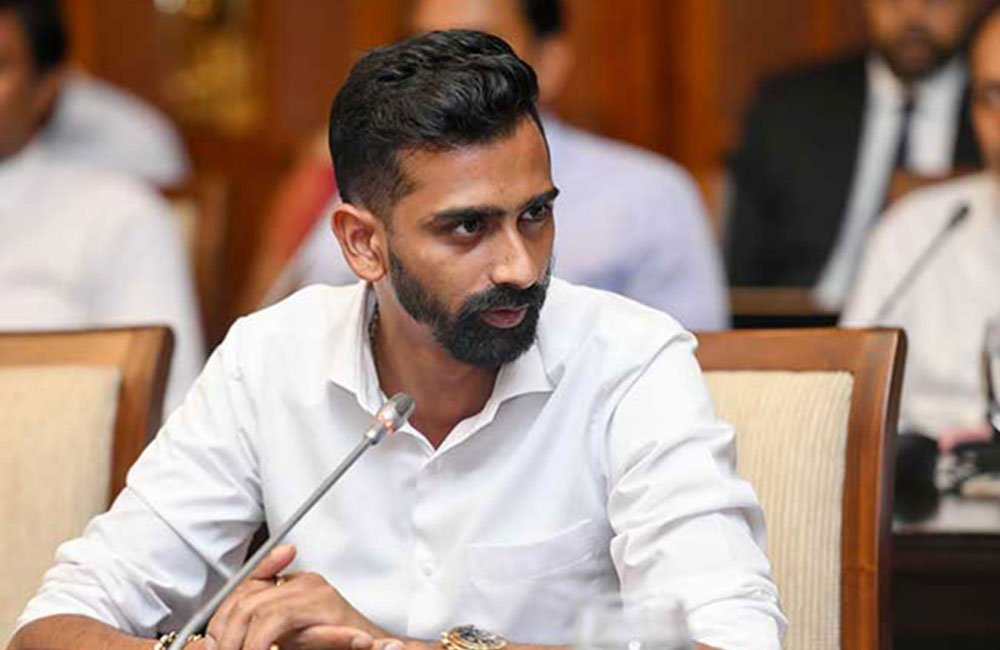
Jeevan Thondaman named Young Global Leader by World Economic Forum
Minister of Water Supply and Estate Infrastructure Development Jeevan Thondaman has been recognised as a Young Global Leader by the World Economic Forum.
This marks him as the first Sri Lankan Minister to achieve such recognition, spotlighting his leadership and efforts towards societal development in Sri Lanka.
The Young Global Leaders programme identifies promising leaders under 40 who are shaping the future. Past inductees include prominent figures like French President Emmanuel Macron, New Zealand Prime Minister Jacinda Ardern, Ali Baba founder and technology entrepreneur Jack Ma and Facebook founder Mark Zuckerberg.
Minister Thondaman’s inclusion in this group comes as recognition for his commitment to public service, focusing on improving living standards and advancing rights for marginalised communities in Sri Lanka.
The Ministry and the World Economic Forum announced Minister Thondaman's selection yesterday (04), highlighting his role in improving access to clean water and advocating for social justice.
Minister Thondaman is currently leading major reforms in the water sector and has commenced new development and policy initiatives aimed at improving life quality for plantation communities. This includes new housing schemes and a land rights programme pursuing economic inclusion for all 1 million members of the plantation community.
In a statement, Minister Thondaman thanked the World Economic Forum and outlined his plans to use the platform for fostering international collaboration and promoting entrepreneurship, particularly among Sri Lanka’s youth.
"This recognition is not just a reflection of my journey, but it stands as a testament to the resilience and spirit of the people of Sri Lanka. I am committed to leveraging this platform to foster greater international collaboration and drive forward our shared goals for sustainable development and equality," he said.
Minister Thondaman's selection as a Young Global Leader is seen as a significant milestone for Sri Lanka, demonstrating the country's leadership on the international stage. It comes at a time when Sri Lanka is navigating economic challenges, positioning Thondaman’s recognition as a positive note for the country’s global image and its potential for future development.
This recognition is not just a personal achievement for Minister Thondaman but also highlights Sri Lanka's growing influence and the importance of its leaders in the global arena, affirming its place in the global community of innovative and forward-thinking leaders.
It is also a major recognition for members of the marginalised plantation community of Sri Lanka that has suffered decades of statelessness, forced repatriation and an indentured form of labour.

Jeevan Thondaman apologises to Muslim community for forced cremation
Minister for Water Supply and Estate Infrastructure Development in Sri Lanka Jeevan Thondaman apologised to the Muslim community for the mandatory cremation policy enforced during the COVID-19 pandemic under the previous government of Gotabaya Rajapaksa.
The unexpected apology came during an Ifthar gathering held in Hatton town on Tuesday (02), hosted by Minister Thondaman.
The Minister apologised and acknowledged the distress the policy had caused among the Muslim community. Although the Minister only assumed duties in January last year, he said it was still important that as the present Minister responsible for water, he had to take responsibility irrespective of who was sitting in his place before.
The forced creation policy under President Gotabaya Rajapaksa was driven by concerns that burial of COVID-19 victims could contaminate water supplies. This was despite several scientific opinions, including that of the World Health Organisation, refuting that claim.
The previous Government’s position has now been challenged and refuted by new scientific findings of a study led by experts from the University of Sri Jayewardenepura and an update to it by the Joint Research and Demonstration Centre for Water Technology (JRDC) at the University of Peradeniya, a centre under the Ministry of Water Supply and Estate Infrastructure Development. The update to the original study was done on the instructions of Minister Thondaman after becoming the subject Minister last year.
The first study, led by experts from the University of Sri Jayewardenepura and financially supported by the Ministry of Water Supply, investigated the presence of the SARS-CoV-2 virus in surface and wastewater across various locations in Sri Lanka. Conducted between August and December 2021, this research aimed to assess the risk of viral transmission through water, a concern that originally motivated the cremation mandate.
Complementing this, a comprehensive review study by the JRDC analysed the effects of COVID-19-infected bodies' burial on groundwater contamination. Published this year, this review concluded there was no risk to groundwater pollution from properly conducted burials during the pandemic. The study emphasised that proper burial procedures, including deep burial in sealed body bags, effectively mitigated any risk of environmental contamination.
The study also highlighted that the presence of SARS-CoV-2 RNA in various water sources did not stem from burial practices but rather from the faeces and urine of infected individuals, further debunking the initial assumptions that underpinned the cremation policy.
The Minister's apology marks a critical step towards healing the wounds inflicted by the pandemic's divisive policies, reaffirming the Government's dedication to evidence-based decision-making and respect for all cultural and religious practices in Sri Lanka.
Minister Thondaman said that he will soon be submitting a Cabinet paper together with the findings of the study to seek a formal apology from the Government for the harm and hurt caused to the Muslim community from the forced cremation policy.
Page 206 of 676